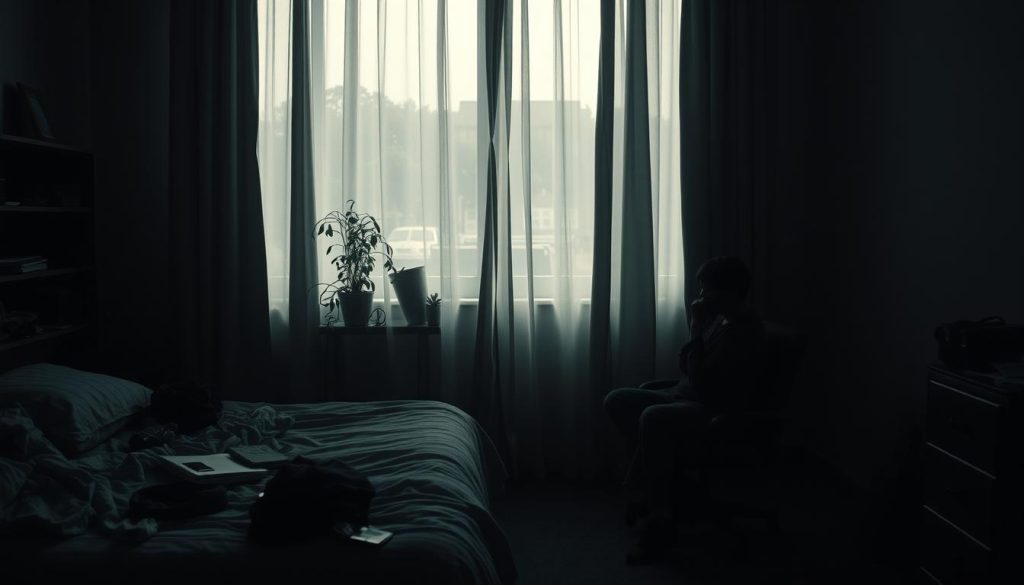Depression is a complex mental health issue that affects many people worldwide. We will look into depression’s different sides, including its definition and types. We’ll also talk about the risk factors and causes that lead to it.
By knowing the symptoms of depression, we can better help ourselves and others. This knowledge helps us seek the right support and work towards recovery.
In this detailed guide, we’ll cover how to spot depression’s signs and the treatments available. We’ll also share ways to cope and practice self-care. These steps can help manage depression and boost well-being.
Our goal is to reduce mental health stigma. We want to support and understand those dealing with depression. This way, we can create a more caring and compassionate community.
What is Depression?
Depression is a serious mental health issue that affects many people. It makes them feel sad, lose interest, and have emotional, thinking, and physical problems. These issues can really change how they live their daily lives.
Definition and Types of Depression
Depression is a mood disorder that makes people feel very sad and hopeless. They might also lose interest in things they used to enjoy. There are different kinds of depression, like major depressive disorder and seasonal affective disorder.
- Major Depressive Disorder: This is the most common depression. It makes people feel sad, lose interest, and change how they sleep, eat, and have energy.
- Persistent Depressive Disorder: Also known as dysthymia, this is a long-lasting, low-grade depression that lasts for at least two years.
- Seasonal Affective Disorder (SAD): This depression happens when the seasons change, usually in the fall and winter. It’s because of less sunlight.
Risk Factors and Causes
Depression can be caused by many things, like genes and the environment. Some key factors include:
- Genetics: Depression might run in families. If someone in your family has it, you might be more likely to get it too.
- Brain Chemistry: Imbalances in brain chemicals like serotonin and dopamine can lead to depression.
- Stressful Life Events: Big changes, like losing a job or a loved one, can make people feel depressed.
- Medical Conditions: Some health problems, like thyroid issues or chronic pain, can make depression more likely.
- Substance Abuse: Using too much alcohol or drugs can mess with brain chemistry and cause depression.
| Risk Factor | Description |
|---|---|
| Genetics | Depression might run in families. If someone in your family has it, you might be more likely to get it too. |
| Brain Chemistry | Imbalances in certain neurotransmitters, such as serotonin, dopamine, and norepinephrine, can contribute to the development of depression. |
| Stressful Life Events | Significant life changes, such as the loss of a job, the end of a relationship, or the death of a loved one, can trigger depressive episodes. |
| Medical Conditions | Certain physical health problems, such as thyroid disorders, chronic pain, or a history of head injuries, can increase the risk of depression. |
| Substance Abuse | Excessive use of alcohol, drugs, or other substances can disrupt brain chemistry and lead to depression. |

Recognizing the Symptoms of Depression
Depression is a complex mental health issue. It shows in many ways. Knowing the common symptoms is key to spotting them and getting help. We’ll look at the main symptoms and how they affect daily life.
Feeling sad or low all the time is a big sign of depression. People with depression often lose interest in things they used to love. They might feel worthless or guilty, and their sleep patterns change.
Depression also affects the body. It can cause tiredness, lack of energy, and changes in appetite. People might also have aches and pains without a clear reason. It can make it hard to focus, make decisions, or remember things.
It’s important to remember that depression shows differently in everyone. Some people have many symptoms, while others have just a few. Spotting these symptoms of depression and signs of depression is the first step to getting help.
| Emotional Symptoms | Cognitive Symptoms | Physical Symptoms |
|---|---|---|
|
|
|

The Impact of Depression on Daily Life
Depression affects daily life in many ways. It impacts physical health, emotions, and thinking. These effects can be very hard to deal with.
Effects on Physical Health
Depression can change how you feel physically. You might have trouble sleeping or sleep too much. Your appetite can also change, leading to weight issues.
Depression can make you feel very tired. Even simple tasks can seem too hard to do.
Emotional and Cognitive Challenges
Depression affects your feelings deeply. You might feel sad, hopeless, and anxious a lot. It can also make you feel bad about yourself and guilty.
Depression can make it hard to focus and remember things. You might find it hard to make decisions too.
| Impact of Depression | Physical Health | Emotional Challenges | Cognitive Challenges |
|---|---|---|---|
| Sleep disturbances | ✓ | ||
| Changes in appetite | ✓ | ||
| Fatigue and low energy | ✓ | ||
| Persistent sadness | ✓ | ||
| Anxiety and low self-esteem | ✓ | ||
| Difficulty concentrating | ✓ | ||
| Memory problems | ✓ | ||
| Indecisiveness | ✓ |

Seeking Support for Depression
Managing depression means getting help. It can make you feel alone, but you’re not. There are many ways to fight depression and feel better.
Treatment Options and Therapies
Talk therapy is a big help for depression. You talk to a therapist to find out why you’re feeling down. They help you find ways to feel better.
There are two main types of talk therapy for depression. One is cognitive-behavioral therapy (CBT). The other is interpersonal therapy (IPT).
Medicine is also a big part of treating depression. Antidepressants help your brain feel better. They can make you feel happier and less sad.
Some people find help in other ways too. Mindfulness, acupuncture, or light therapy can help. These can be used along with other treatments.
It’s important to work with your doctor to find the best treatment. With the right help, you can beat depression and feel good again.
Coping Strategies and Self-Care for Depression
When we face depression, having good coping strategies and self-care is key. These help us deal with symptoms, feel better, and stay healthy. Let’s look at some effective ways to help.
Mindfulness is a strong strategy. It helps us stay in the moment, lowers stress, and brings calm. Simple exercises like deep breathing or body scans can be part of our day.
Exercise is also crucial for self-care. It makes us feel good and gives us energy. Whether it’s walking, yoga, or a workout, doing what we like helps our mind.
It’s also important to keep our social connections strong. Talking to friends, joining groups, or doing fun activities helps us feel less alone. Depression often makes us feel isolated.
Having a daily routine is also key. It gives us structure and stability. This includes sleeping well, eating right, and taking time to relax and think. Taking care of ourselves helps us handle depression better.
Remember, fighting depression is a journey. We need to be kind to ourselves as we try different things. By using these self-care tips, we can help ourselves get better and live a better life.
| Coping Strategies | Benefits |
|---|---|
| Mindfulness | Reduces stress, increases self-awareness, cultivates inner calm |
| Regular Exercise | Boosts mood and energy levels, releases endorphins |
| Social Connections | Alleviates feelings of isolation and loneliness |
| Supportive Daily Routine | Provides structure, stability, and supports overall well-being |
Breaking the Stigma: Raising Awareness About Depression
We need to tackle the stigma around depression to make our society kinder. We must work together to knock down the bad ideas that stop people from getting help. By talking openly about depression, we can help others feel less alone and more ready to seek help.
Depression is a common issue that affects many, but it’s often not understood. We can change this by teaching people, sharing our stories, and pushing for more mental health support. This way, we can make it okay to talk about depression and show it’s a sign of courage.
By talking more about depression, we can fight the stigma and make it seem more normal. When we share what it’s like to live with depression, we help others understand and support us better. Together, we can build a world that values the bravery of those who face depression and encourages others to do the same.

